Professional Identity and Practice: A Hilton Hotel Case Study (Unit 3)
VerifiedAdded on 2023/01/11
|11
|3100
|93
Report
AI Summary
This report provides an in-depth analysis of professional identity and practice, using Hilton Hotel as a case study. It begins with an introduction to personal and professional development, highlighting its importance. LO1 focuses on the importance of professional and self-directed learning, providing an overview of Hilton Hotel, its history, and the benefits of ongoing professional development for both the employer and employees. The report discusses professional standards, expectations, and the significance of brand image projection in the hospitality sector. It also covers the business, soft, and hard skills expected in the workplace, including customer service skills. LO2 examines the assessment of one's own competences, skills, and different learning and development approaches, including self-assessment techniques like soft skill audits and SWOT analysis. The report also explores the Belbin team roles model within the context of Hilton Hotel's operations. The report concludes by summarizing the key findings and implications of the analysis. The report covers all aspects of professional development to enhance the skills and capabilities of employees.
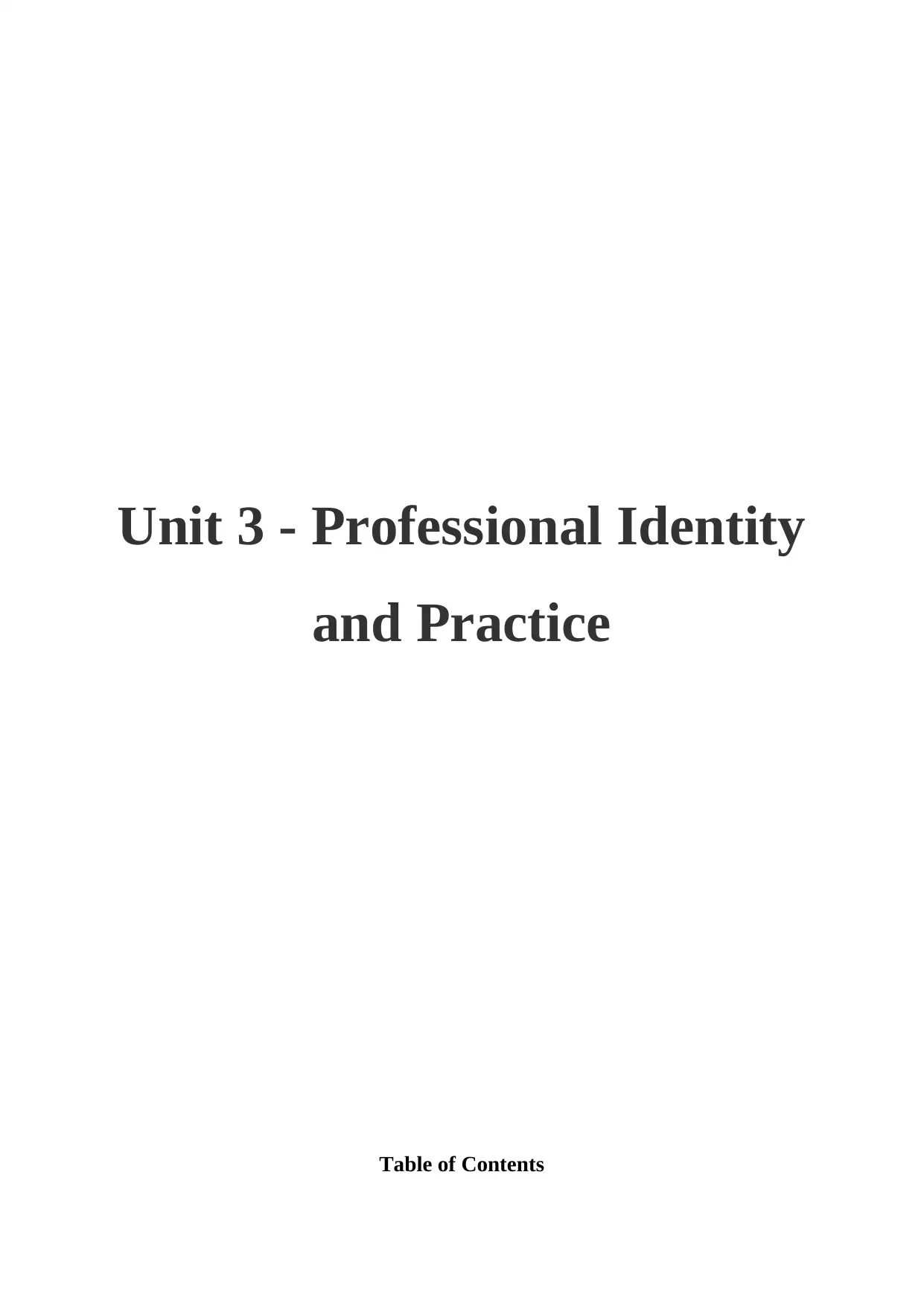
Unit 3 - Professional Identity
and Practice
Table of Contents
and Practice
Table of Contents
Paraphrase This Document
Need a fresh take? Get an instant paraphrase of this document with our AI Paraphraser
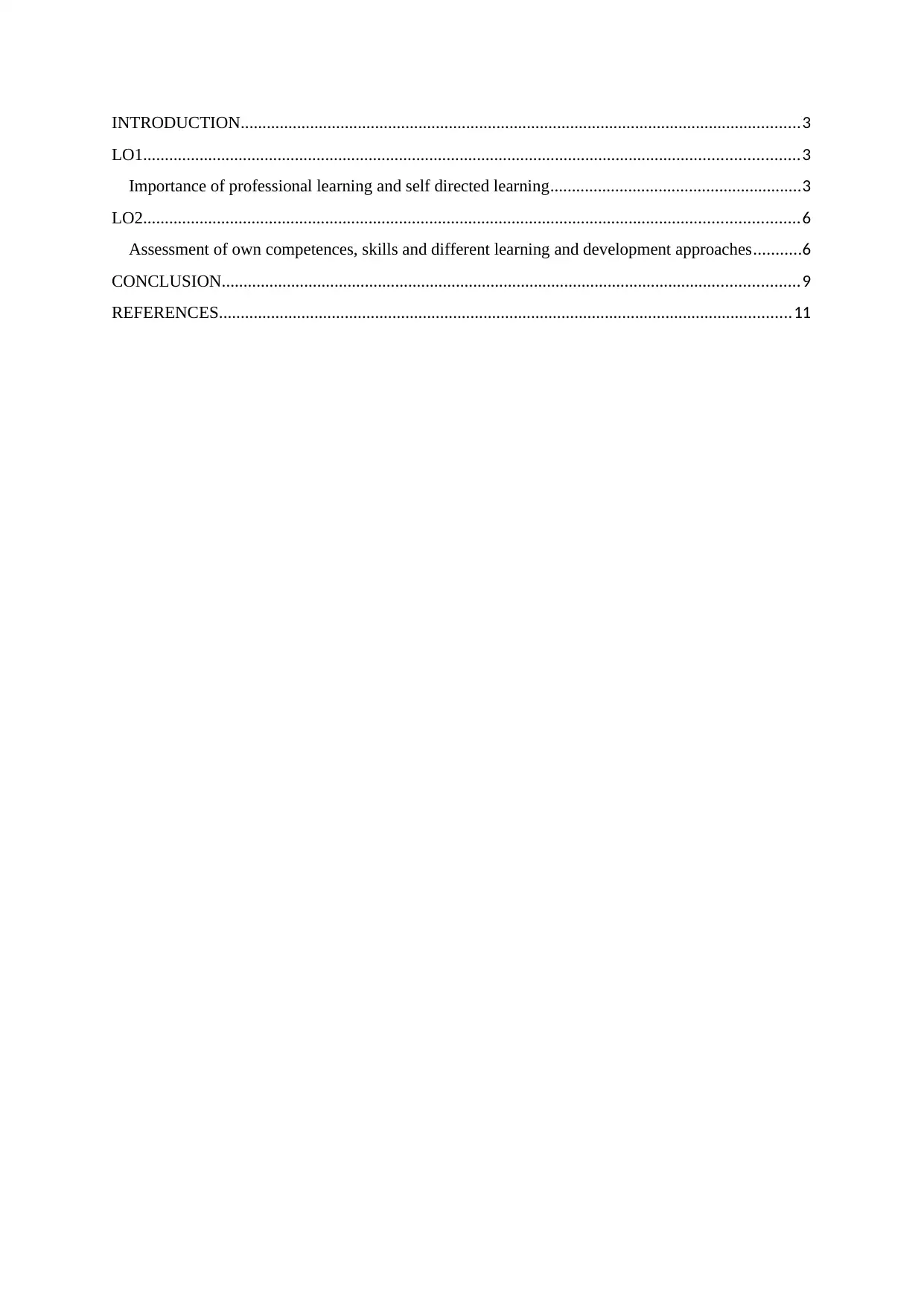
INTRODUCTION.................................................................................................................................3
LO1.......................................................................................................................................................3
Importance of professional learning and self directed learning..........................................................3
LO2.......................................................................................................................................................6
Assessment of own competences, skills and different learning and development approaches...........6
CONCLUSION.....................................................................................................................................9
REFERENCES....................................................................................................................................11
LO1.......................................................................................................................................................3
Importance of professional learning and self directed learning..........................................................3
LO2.......................................................................................................................................................6
Assessment of own competences, skills and different learning and development approaches...........6
CONCLUSION.....................................................................................................................................9
REFERENCES....................................................................................................................................11
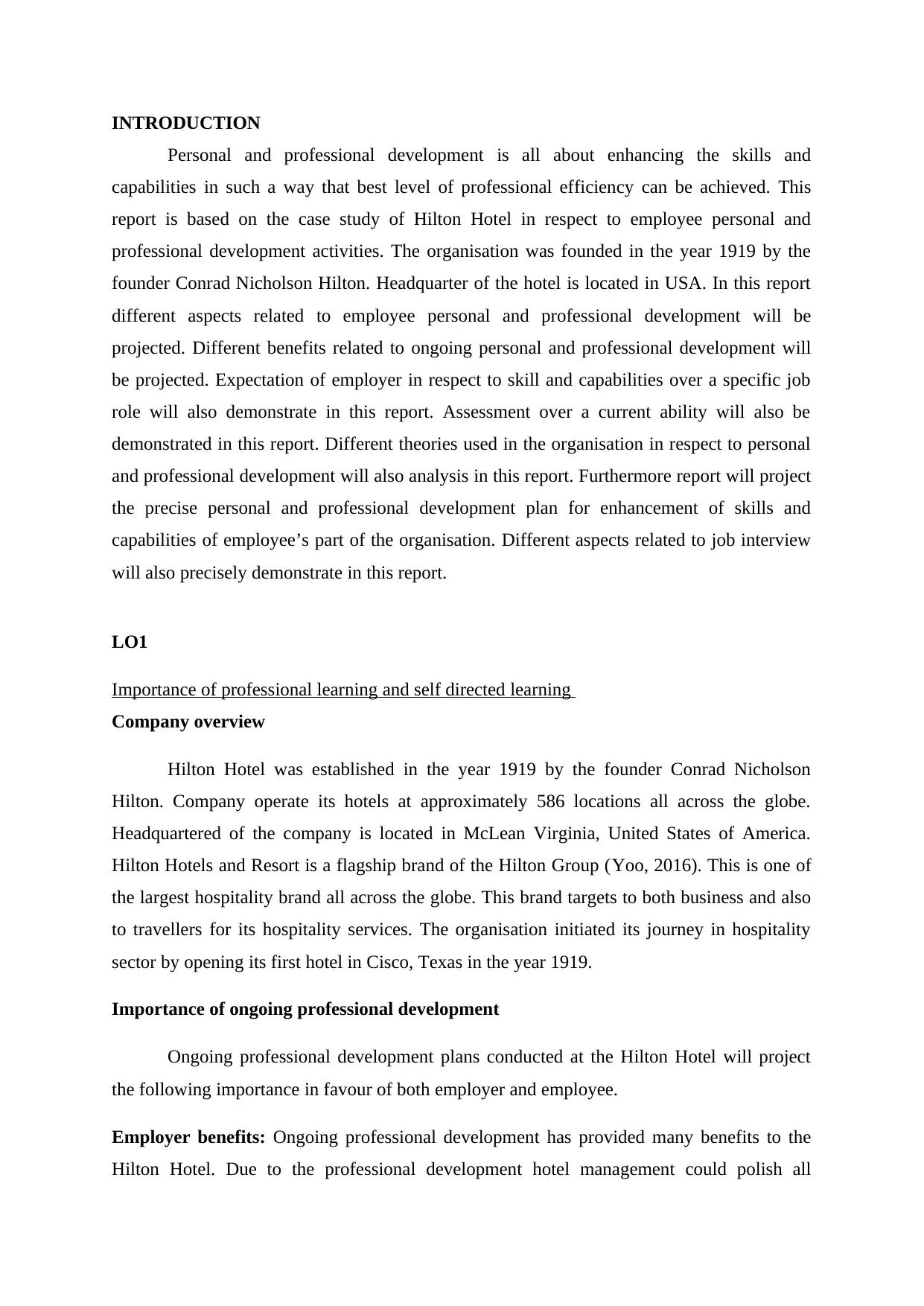
INTRODUCTION
Personal and professional development is all about enhancing the skills and
capabilities in such a way that best level of professional efficiency can be achieved. This
report is based on the case study of Hilton Hotel in respect to employee personal and
professional development activities. The organisation was founded in the year 1919 by the
founder Conrad Nicholson Hilton. Headquarter of the hotel is located in USA. In this report
different aspects related to employee personal and professional development will be
projected. Different benefits related to ongoing personal and professional development will
be projected. Expectation of employer in respect to skill and capabilities over a specific job
role will also demonstrate in this report. Assessment over a current ability will also be
demonstrated in this report. Different theories used in the organisation in respect to personal
and professional development will also analysis in this report. Furthermore report will project
the precise personal and professional development plan for enhancement of skills and
capabilities of employee’s part of the organisation. Different aspects related to job interview
will also precisely demonstrate in this report.
LO1
Importance of professional learning and self directed learning
Company overview
Hilton Hotel was established in the year 1919 by the founder Conrad Nicholson
Hilton. Company operate its hotels at approximately 586 locations all across the globe.
Headquartered of the company is located in McLean Virginia, United States of America.
Hilton Hotels and Resort is a flagship brand of the Hilton Group (Yoo, 2016). This is one of
the largest hospitality brand all across the globe. This brand targets to both business and also
to travellers for its hospitality services. The organisation initiated its journey in hospitality
sector by opening its first hotel in Cisco, Texas in the year 1919.
Importance of ongoing professional development
Ongoing professional development plans conducted at the Hilton Hotel will project
the following importance in favour of both employer and employee.
Employer benefits: Ongoing professional development has provided many benefits to the
Hilton Hotel. Due to the professional development hotel management could polish all
Personal and professional development is all about enhancing the skills and
capabilities in such a way that best level of professional efficiency can be achieved. This
report is based on the case study of Hilton Hotel in respect to employee personal and
professional development activities. The organisation was founded in the year 1919 by the
founder Conrad Nicholson Hilton. Headquarter of the hotel is located in USA. In this report
different aspects related to employee personal and professional development will be
projected. Different benefits related to ongoing personal and professional development will
be projected. Expectation of employer in respect to skill and capabilities over a specific job
role will also demonstrate in this report. Assessment over a current ability will also be
demonstrated in this report. Different theories used in the organisation in respect to personal
and professional development will also analysis in this report. Furthermore report will project
the precise personal and professional development plan for enhancement of skills and
capabilities of employee’s part of the organisation. Different aspects related to job interview
will also precisely demonstrate in this report.
LO1
Importance of professional learning and self directed learning
Company overview
Hilton Hotel was established in the year 1919 by the founder Conrad Nicholson
Hilton. Company operate its hotels at approximately 586 locations all across the globe.
Headquartered of the company is located in McLean Virginia, United States of America.
Hilton Hotels and Resort is a flagship brand of the Hilton Group (Yoo, 2016). This is one of
the largest hospitality brand all across the globe. This brand targets to both business and also
to travellers for its hospitality services. The organisation initiated its journey in hospitality
sector by opening its first hotel in Cisco, Texas in the year 1919.
Importance of ongoing professional development
Ongoing professional development plans conducted at the Hilton Hotel will project
the following importance in favour of both employer and employee.
Employer benefits: Ongoing professional development has provided many benefits to the
Hilton Hotel. Due to the professional development hotel management could polish all
⊘ This is a preview!⊘
Do you want full access?
Subscribe today to unlock all pages.

Trusted by 1+ million students worldwide
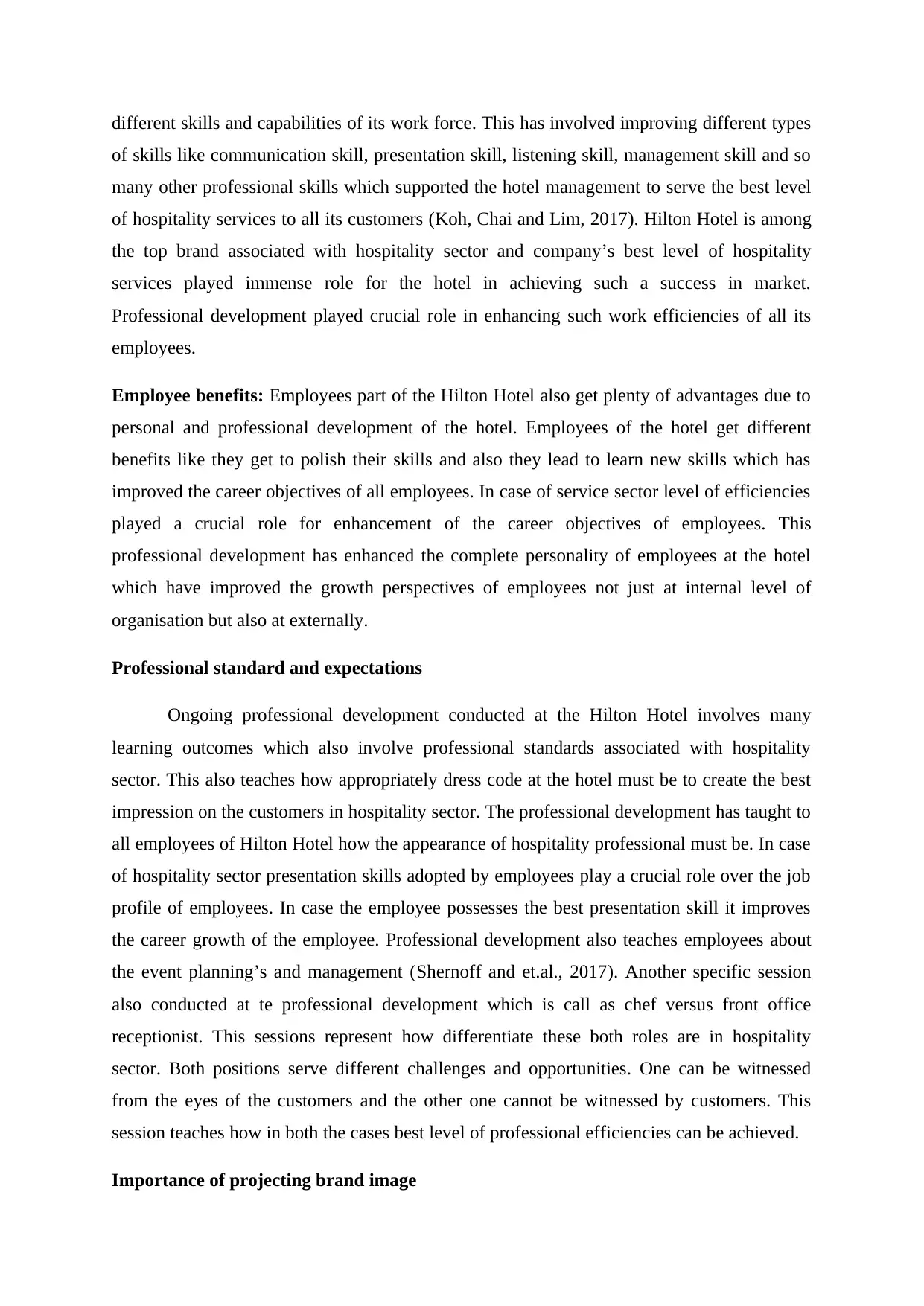
different skills and capabilities of its work force. This has involved improving different types
of skills like communication skill, presentation skill, listening skill, management skill and so
many other professional skills which supported the hotel management to serve the best level
of hospitality services to all its customers (Koh, Chai and Lim, 2017). Hilton Hotel is among
the top brand associated with hospitality sector and company’s best level of hospitality
services played immense role for the hotel in achieving such a success in market.
Professional development played crucial role in enhancing such work efficiencies of all its
employees.
Employee benefits: Employees part of the Hilton Hotel also get plenty of advantages due to
personal and professional development of the hotel. Employees of the hotel get different
benefits like they get to polish their skills and also they lead to learn new skills which has
improved the career objectives of all employees. In case of service sector level of efficiencies
played a crucial role for enhancement of the career objectives of employees. This
professional development has enhanced the complete personality of employees at the hotel
which have improved the growth perspectives of employees not just at internal level of
organisation but also at externally.
Professional standard and expectations
Ongoing professional development conducted at the Hilton Hotel involves many
learning outcomes which also involve professional standards associated with hospitality
sector. This also teaches how appropriately dress code at the hotel must be to create the best
impression on the customers in hospitality sector. The professional development has taught to
all employees of Hilton Hotel how the appearance of hospitality professional must be. In case
of hospitality sector presentation skills adopted by employees play a crucial role over the job
profile of employees. In case the employee possesses the best presentation skill it improves
the career growth of the employee. Professional development also teaches employees about
the event planning’s and management (Shernoff and et.al., 2017). Another specific session
also conducted at te professional development which is call as chef versus front office
receptionist. This sessions represent how differentiate these both roles are in hospitality
sector. Both positions serve different challenges and opportunities. One can be witnessed
from the eyes of the customers and the other one cannot be witnessed by customers. This
session teaches how in both the cases best level of professional efficiencies can be achieved.
Importance of projecting brand image
of skills like communication skill, presentation skill, listening skill, management skill and so
many other professional skills which supported the hotel management to serve the best level
of hospitality services to all its customers (Koh, Chai and Lim, 2017). Hilton Hotel is among
the top brand associated with hospitality sector and company’s best level of hospitality
services played immense role for the hotel in achieving such a success in market.
Professional development played crucial role in enhancing such work efficiencies of all its
employees.
Employee benefits: Employees part of the Hilton Hotel also get plenty of advantages due to
personal and professional development of the hotel. Employees of the hotel get different
benefits like they get to polish their skills and also they lead to learn new skills which has
improved the career objectives of all employees. In case of service sector level of efficiencies
played a crucial role for enhancement of the career objectives of employees. This
professional development has enhanced the complete personality of employees at the hotel
which have improved the growth perspectives of employees not just at internal level of
organisation but also at externally.
Professional standard and expectations
Ongoing professional development conducted at the Hilton Hotel involves many
learning outcomes which also involve professional standards associated with hospitality
sector. This also teaches how appropriately dress code at the hotel must be to create the best
impression on the customers in hospitality sector. The professional development has taught to
all employees of Hilton Hotel how the appearance of hospitality professional must be. In case
of hospitality sector presentation skills adopted by employees play a crucial role over the job
profile of employees. In case the employee possesses the best presentation skill it improves
the career growth of the employee. Professional development also teaches employees about
the event planning’s and management (Shernoff and et.al., 2017). Another specific session
also conducted at te professional development which is call as chef versus front office
receptionist. This sessions represent how differentiate these both roles are in hospitality
sector. Both positions serve different challenges and opportunities. One can be witnessed
from the eyes of the customers and the other one cannot be witnessed by customers. This
session teaches how in both the cases best level of professional efficiencies can be achieved.
Importance of projecting brand image
Paraphrase This Document
Need a fresh take? Get an instant paraphrase of this document with our AI Paraphraser
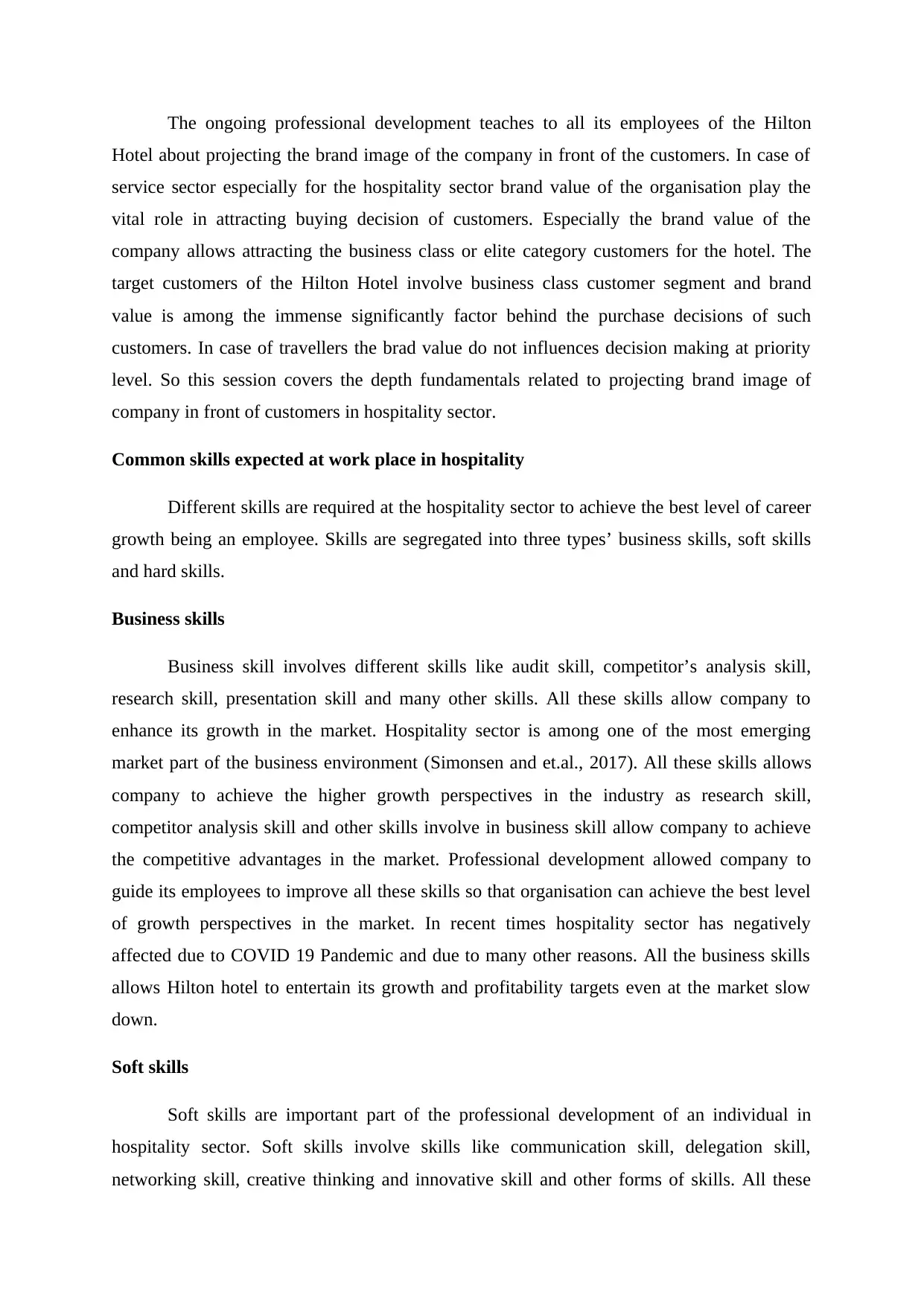
The ongoing professional development teaches to all its employees of the Hilton
Hotel about projecting the brand image of the company in front of the customers. In case of
service sector especially for the hospitality sector brand value of the organisation play the
vital role in attracting buying decision of customers. Especially the brand value of the
company allows attracting the business class or elite category customers for the hotel. The
target customers of the Hilton Hotel involve business class customer segment and brand
value is among the immense significantly factor behind the purchase decisions of such
customers. In case of travellers the brad value do not influences decision making at priority
level. So this session covers the depth fundamentals related to projecting brand image of
company in front of customers in hospitality sector.
Common skills expected at work place in hospitality
Different skills are required at the hospitality sector to achieve the best level of career
growth being an employee. Skills are segregated into three types’ business skills, soft skills
and hard skills.
Business skills
Business skill involves different skills like audit skill, competitor’s analysis skill,
research skill, presentation skill and many other skills. All these skills allow company to
enhance its growth in the market. Hospitality sector is among one of the most emerging
market part of the business environment (Simonsen and et.al., 2017). All these skills allows
company to achieve the higher growth perspectives in the industry as research skill,
competitor analysis skill and other skills involve in business skill allow company to achieve
the competitive advantages in the market. Professional development allowed company to
guide its employees to improve all these skills so that organisation can achieve the best level
of growth perspectives in the market. In recent times hospitality sector has negatively
affected due to COVID 19 Pandemic and due to many other reasons. All the business skills
allows Hilton hotel to entertain its growth and profitability targets even at the market slow
down.
Soft skills
Soft skills are important part of the professional development of an individual in
hospitality sector. Soft skills involve skills like communication skill, delegation skill,
networking skill, creative thinking and innovative skill and other forms of skills. All these
Hotel about projecting the brand image of the company in front of the customers. In case of
service sector especially for the hospitality sector brand value of the organisation play the
vital role in attracting buying decision of customers. Especially the brand value of the
company allows attracting the business class or elite category customers for the hotel. The
target customers of the Hilton Hotel involve business class customer segment and brand
value is among the immense significantly factor behind the purchase decisions of such
customers. In case of travellers the brad value do not influences decision making at priority
level. So this session covers the depth fundamentals related to projecting brand image of
company in front of customers in hospitality sector.
Common skills expected at work place in hospitality
Different skills are required at the hospitality sector to achieve the best level of career
growth being an employee. Skills are segregated into three types’ business skills, soft skills
and hard skills.
Business skills
Business skill involves different skills like audit skill, competitor’s analysis skill,
research skill, presentation skill and many other skills. All these skills allow company to
enhance its growth in the market. Hospitality sector is among one of the most emerging
market part of the business environment (Simonsen and et.al., 2017). All these skills allows
company to achieve the higher growth perspectives in the industry as research skill,
competitor analysis skill and other skills involve in business skill allow company to achieve
the competitive advantages in the market. Professional development allowed company to
guide its employees to improve all these skills so that organisation can achieve the best level
of growth perspectives in the market. In recent times hospitality sector has negatively
affected due to COVID 19 Pandemic and due to many other reasons. All the business skills
allows Hilton hotel to entertain its growth and profitability targets even at the market slow
down.
Soft skills
Soft skills are important part of the professional development of an individual in
hospitality sector. Soft skills involve skills like communication skill, delegation skill,
networking skill, creative thinking and innovative skill and other forms of skills. All these
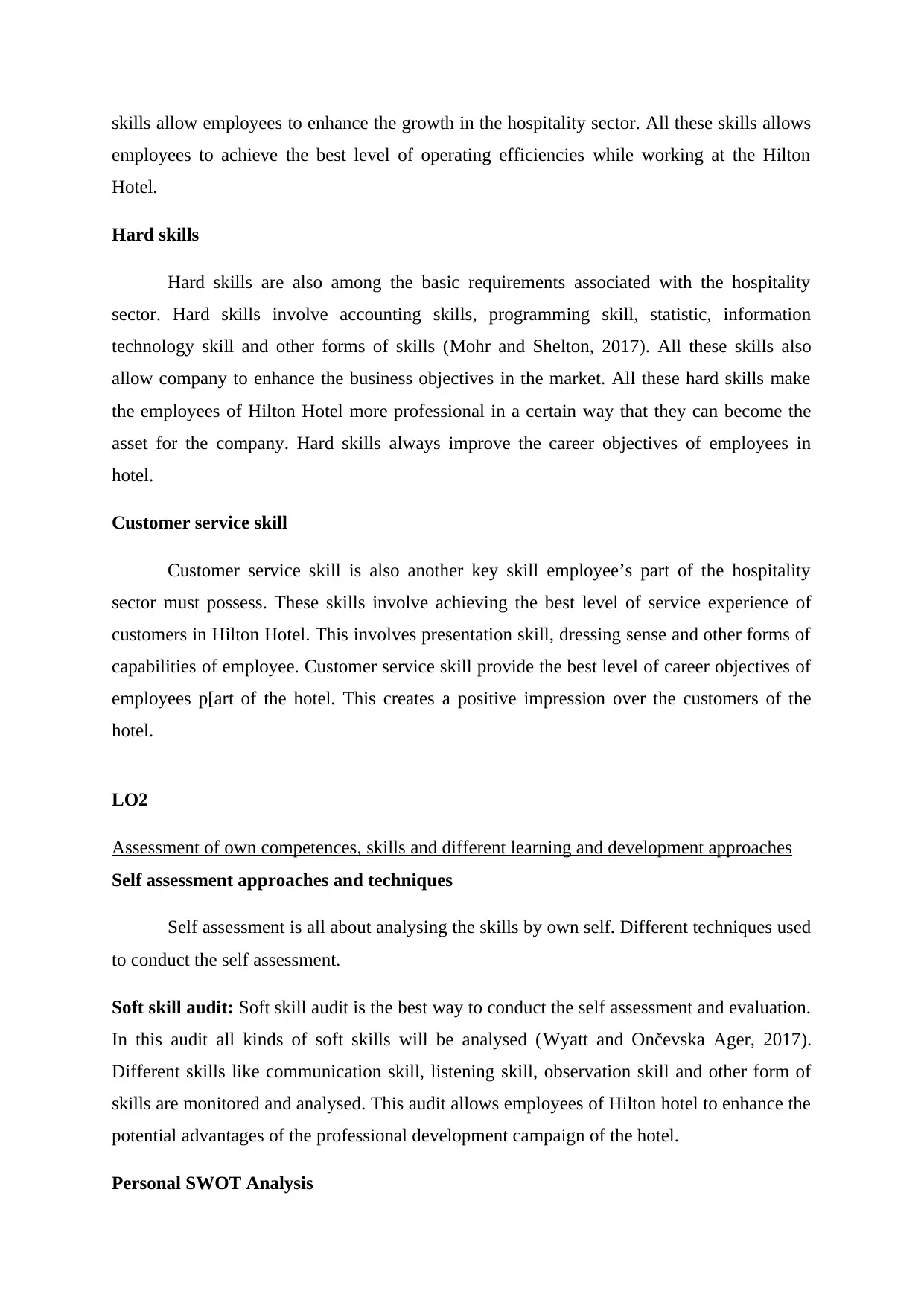
skills allow employees to enhance the growth in the hospitality sector. All these skills allows
employees to achieve the best level of operating efficiencies while working at the Hilton
Hotel.
Hard skills
Hard skills are also among the basic requirements associated with the hospitality
sector. Hard skills involve accounting skills, programming skill, statistic, information
technology skill and other forms of skills (Mohr and Shelton, 2017). All these skills also
allow company to enhance the business objectives in the market. All these hard skills make
the employees of Hilton Hotel more professional in a certain way that they can become the
asset for the company. Hard skills always improve the career objectives of employees in
hotel.
Customer service skill
Customer service skill is also another key skill employee’s part of the hospitality
sector must possess. These skills involve achieving the best level of service experience of
customers in Hilton Hotel. This involves presentation skill, dressing sense and other forms of
capabilities of employee. Customer service skill provide the best level of career objectives of
employees p[art of the hotel. This creates a positive impression over the customers of the
hotel.
LO2
Assessment of own competences, skills and different learning and development approaches
Self assessment approaches and techniques
Self assessment is all about analysing the skills by own self. Different techniques used
to conduct the self assessment.
Soft skill audit: Soft skill audit is the best way to conduct the self assessment and evaluation.
In this audit all kinds of soft skills will be analysed (Wyatt and Ončevska Ager, 2017).
Different skills like communication skill, listening skill, observation skill and other form of
skills are monitored and analysed. This audit allows employees of Hilton hotel to enhance the
potential advantages of the professional development campaign of the hotel.
Personal SWOT Analysis
employees to achieve the best level of operating efficiencies while working at the Hilton
Hotel.
Hard skills
Hard skills are also among the basic requirements associated with the hospitality
sector. Hard skills involve accounting skills, programming skill, statistic, information
technology skill and other forms of skills (Mohr and Shelton, 2017). All these skills also
allow company to enhance the business objectives in the market. All these hard skills make
the employees of Hilton Hotel more professional in a certain way that they can become the
asset for the company. Hard skills always improve the career objectives of employees in
hotel.
Customer service skill
Customer service skill is also another key skill employee’s part of the hospitality
sector must possess. These skills involve achieving the best level of service experience of
customers in Hilton Hotel. This involves presentation skill, dressing sense and other forms of
capabilities of employee. Customer service skill provide the best level of career objectives of
employees p[art of the hotel. This creates a positive impression over the customers of the
hotel.
LO2
Assessment of own competences, skills and different learning and development approaches
Self assessment approaches and techniques
Self assessment is all about analysing the skills by own self. Different techniques used
to conduct the self assessment.
Soft skill audit: Soft skill audit is the best way to conduct the self assessment and evaluation.
In this audit all kinds of soft skills will be analysed (Wyatt and Ončevska Ager, 2017).
Different skills like communication skill, listening skill, observation skill and other form of
skills are monitored and analysed. This audit allows employees of Hilton hotel to enhance the
potential advantages of the professional development campaign of the hotel.
Personal SWOT Analysis
⊘ This is a preview!⊘
Do you want full access?
Subscribe today to unlock all pages.

Trusted by 1+ million students worldwide
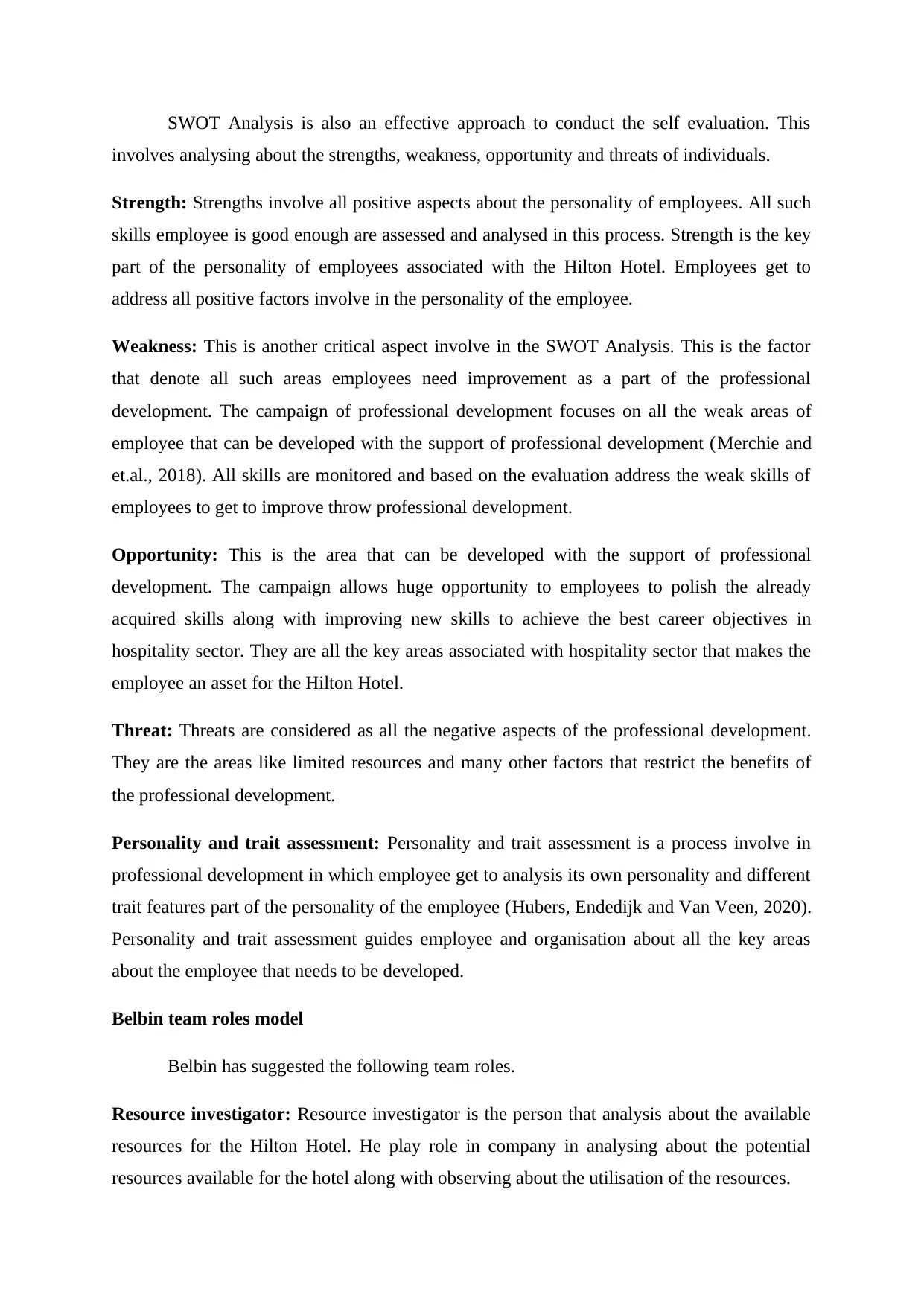
SWOT Analysis is also an effective approach to conduct the self evaluation. This
involves analysing about the strengths, weakness, opportunity and threats of individuals.
Strength: Strengths involve all positive aspects about the personality of employees. All such
skills employee is good enough are assessed and analysed in this process. Strength is the key
part of the personality of employees associated with the Hilton Hotel. Employees get to
address all positive factors involve in the personality of the employee.
Weakness: This is another critical aspect involve in the SWOT Analysis. This is the factor
that denote all such areas employees need improvement as a part of the professional
development. The campaign of professional development focuses on all the weak areas of
employee that can be developed with the support of professional development (Merchie and
et.al., 2018). All skills are monitored and based on the evaluation address the weak skills of
employees to get to improve throw professional development.
Opportunity: This is the area that can be developed with the support of professional
development. The campaign allows huge opportunity to employees to polish the already
acquired skills along with improving new skills to achieve the best career objectives in
hospitality sector. They are all the key areas associated with hospitality sector that makes the
employee an asset for the Hilton Hotel.
Threat: Threats are considered as all the negative aspects of the professional development.
They are the areas like limited resources and many other factors that restrict the benefits of
the professional development.
Personality and trait assessment: Personality and trait assessment is a process involve in
professional development in which employee get to analysis its own personality and different
trait features part of the personality of the employee (Hubers, Endedijk and Van Veen, 2020).
Personality and trait assessment guides employee and organisation about all the key areas
about the employee that needs to be developed.
Belbin team roles model
Belbin has suggested the following team roles.
Resource investigator: Resource investigator is the person that analysis about the available
resources for the Hilton Hotel. He play role in company in analysing about the potential
resources available for the hotel along with observing about the utilisation of the resources.
involves analysing about the strengths, weakness, opportunity and threats of individuals.
Strength: Strengths involve all positive aspects about the personality of employees. All such
skills employee is good enough are assessed and analysed in this process. Strength is the key
part of the personality of employees associated with the Hilton Hotel. Employees get to
address all positive factors involve in the personality of the employee.
Weakness: This is another critical aspect involve in the SWOT Analysis. This is the factor
that denote all such areas employees need improvement as a part of the professional
development. The campaign of professional development focuses on all the weak areas of
employee that can be developed with the support of professional development (Merchie and
et.al., 2018). All skills are monitored and based on the evaluation address the weak skills of
employees to get to improve throw professional development.
Opportunity: This is the area that can be developed with the support of professional
development. The campaign allows huge opportunity to employees to polish the already
acquired skills along with improving new skills to achieve the best career objectives in
hospitality sector. They are all the key areas associated with hospitality sector that makes the
employee an asset for the Hilton Hotel.
Threat: Threats are considered as all the negative aspects of the professional development.
They are the areas like limited resources and many other factors that restrict the benefits of
the professional development.
Personality and trait assessment: Personality and trait assessment is a process involve in
professional development in which employee get to analysis its own personality and different
trait features part of the personality of the employee (Hubers, Endedijk and Van Veen, 2020).
Personality and trait assessment guides employee and organisation about all the key areas
about the employee that needs to be developed.
Belbin team roles model
Belbin has suggested the following team roles.
Resource investigator: Resource investigator is the person that analysis about the available
resources for the Hilton Hotel. He play role in company in analysing about the potential
resources available for the hotel along with observing about the utilisation of the resources.
Paraphrase This Document
Need a fresh take? Get an instant paraphrase of this document with our AI Paraphraser
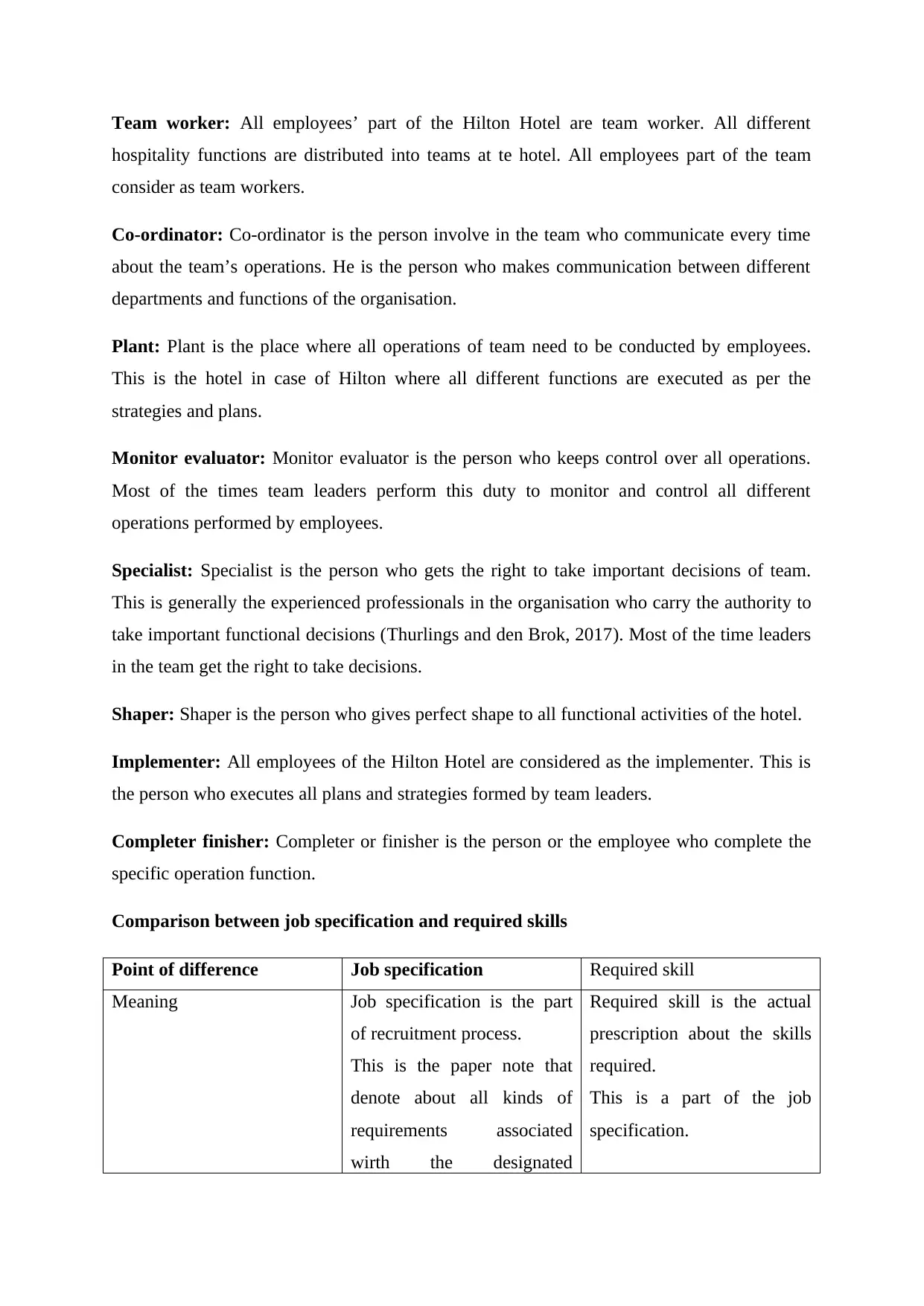
Team worker: All employees’ part of the Hilton Hotel are team worker. All different
hospitality functions are distributed into teams at te hotel. All employees part of the team
consider as team workers.
Co-ordinator: Co-ordinator is the person involve in the team who communicate every time
about the team’s operations. He is the person who makes communication between different
departments and functions of the organisation.
Plant: Plant is the place where all operations of team need to be conducted by employees.
This is the hotel in case of Hilton where all different functions are executed as per the
strategies and plans.
Monitor evaluator: Monitor evaluator is the person who keeps control over all operations.
Most of the times team leaders perform this duty to monitor and control all different
operations performed by employees.
Specialist: Specialist is the person who gets the right to take important decisions of team.
This is generally the experienced professionals in the organisation who carry the authority to
take important functional decisions (Thurlings and den Brok, 2017). Most of the time leaders
in the team get the right to take decisions.
Shaper: Shaper is the person who gives perfect shape to all functional activities of the hotel.
Implementer: All employees of the Hilton Hotel are considered as the implementer. This is
the person who executes all plans and strategies formed by team leaders.
Completer finisher: Completer or finisher is the person or the employee who complete the
specific operation function.
Comparison between job specification and required skills
Point of difference Job specification Required skill
Meaning Job specification is the part
of recruitment process.
This is the paper note that
denote about all kinds of
requirements associated
wirth the designated
Required skill is the actual
prescription about the skills
required.
This is a part of the job
specification.
hospitality functions are distributed into teams at te hotel. All employees part of the team
consider as team workers.
Co-ordinator: Co-ordinator is the person involve in the team who communicate every time
about the team’s operations. He is the person who makes communication between different
departments and functions of the organisation.
Plant: Plant is the place where all operations of team need to be conducted by employees.
This is the hotel in case of Hilton where all different functions are executed as per the
strategies and plans.
Monitor evaluator: Monitor evaluator is the person who keeps control over all operations.
Most of the times team leaders perform this duty to monitor and control all different
operations performed by employees.
Specialist: Specialist is the person who gets the right to take important decisions of team.
This is generally the experienced professionals in the organisation who carry the authority to
take important functional decisions (Thurlings and den Brok, 2017). Most of the time leaders
in the team get the right to take decisions.
Shaper: Shaper is the person who gives perfect shape to all functional activities of the hotel.
Implementer: All employees of the Hilton Hotel are considered as the implementer. This is
the person who executes all plans and strategies formed by team leaders.
Completer finisher: Completer or finisher is the person or the employee who complete the
specific operation function.
Comparison between job specification and required skills
Point of difference Job specification Required skill
Meaning Job specification is the part
of recruitment process.
This is the paper note that
denote about all kinds of
requirements associated
wirth the designated
Required skill is the actual
prescription about the skills
required.
This is a part of the job
specification.
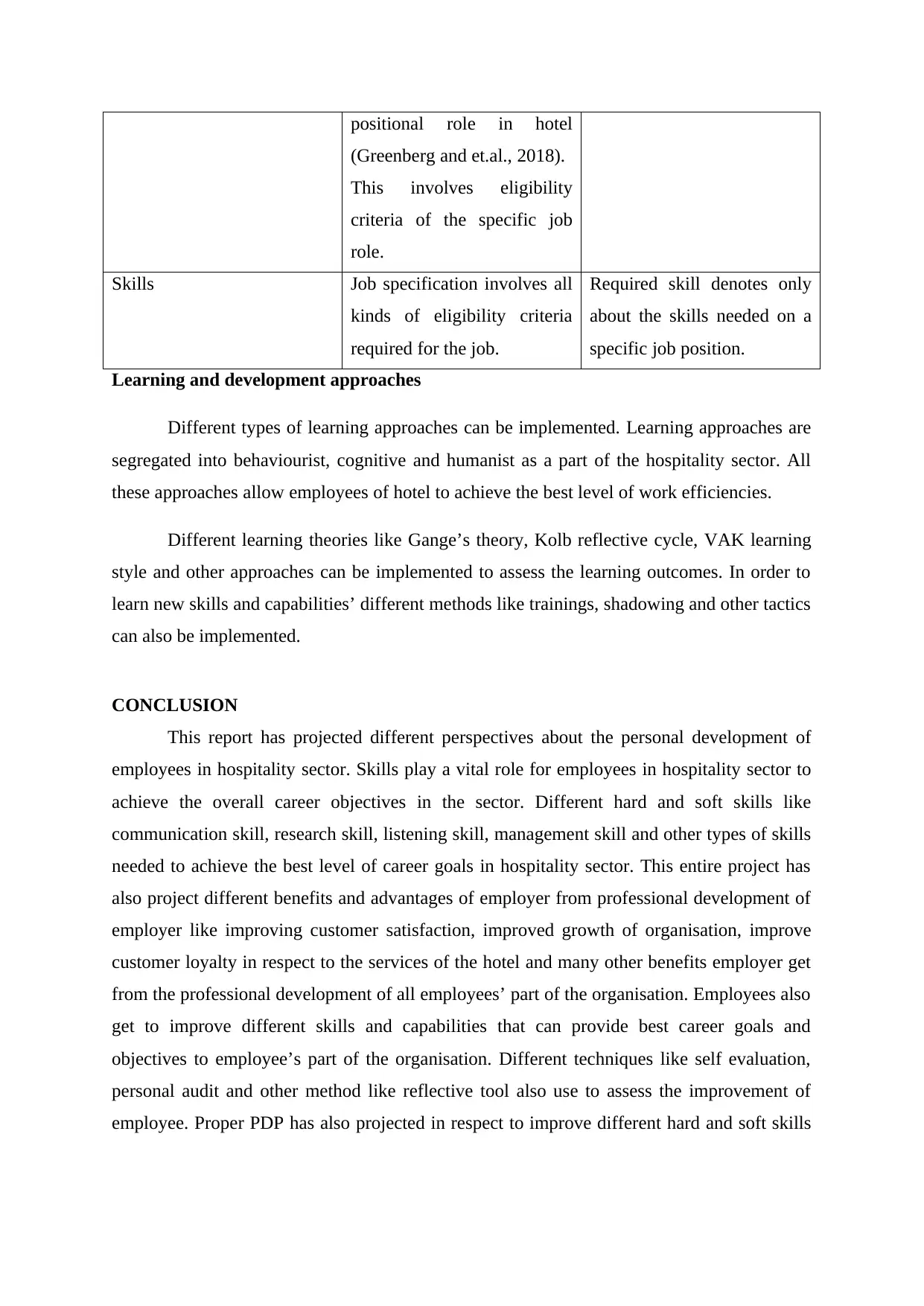
positional role in hotel
(Greenberg and et.al., 2018).
This involves eligibility
criteria of the specific job
role.
Skills Job specification involves all
kinds of eligibility criteria
required for the job.
Required skill denotes only
about the skills needed on a
specific job position.
Learning and development approaches
Different types of learning approaches can be implemented. Learning approaches are
segregated into behaviourist, cognitive and humanist as a part of the hospitality sector. All
these approaches allow employees of hotel to achieve the best level of work efficiencies.
Different learning theories like Gange’s theory, Kolb reflective cycle, VAK learning
style and other approaches can be implemented to assess the learning outcomes. In order to
learn new skills and capabilities’ different methods like trainings, shadowing and other tactics
can also be implemented.
CONCLUSION
This report has projected different perspectives about the personal development of
employees in hospitality sector. Skills play a vital role for employees in hospitality sector to
achieve the overall career objectives in the sector. Different hard and soft skills like
communication skill, research skill, listening skill, management skill and other types of skills
needed to achieve the best level of career goals in hospitality sector. This entire project has
also project different benefits and advantages of employer from professional development of
employer like improving customer satisfaction, improved growth of organisation, improve
customer loyalty in respect to the services of the hotel and many other benefits employer get
from the professional development of all employees’ part of the organisation. Employees also
get to improve different skills and capabilities that can provide best career goals and
objectives to employee’s part of the organisation. Different techniques like self evaluation,
personal audit and other method like reflective tool also use to assess the improvement of
employee. Proper PDP has also projected in respect to improve different hard and soft skills
(Greenberg and et.al., 2018).
This involves eligibility
criteria of the specific job
role.
Skills Job specification involves all
kinds of eligibility criteria
required for the job.
Required skill denotes only
about the skills needed on a
specific job position.
Learning and development approaches
Different types of learning approaches can be implemented. Learning approaches are
segregated into behaviourist, cognitive and humanist as a part of the hospitality sector. All
these approaches allow employees of hotel to achieve the best level of work efficiencies.
Different learning theories like Gange’s theory, Kolb reflective cycle, VAK learning
style and other approaches can be implemented to assess the learning outcomes. In order to
learn new skills and capabilities’ different methods like trainings, shadowing and other tactics
can also be implemented.
CONCLUSION
This report has projected different perspectives about the personal development of
employees in hospitality sector. Skills play a vital role for employees in hospitality sector to
achieve the overall career objectives in the sector. Different hard and soft skills like
communication skill, research skill, listening skill, management skill and other types of skills
needed to achieve the best level of career goals in hospitality sector. This entire project has
also project different benefits and advantages of employer from professional development of
employer like improving customer satisfaction, improved growth of organisation, improve
customer loyalty in respect to the services of the hotel and many other benefits employer get
from the professional development of all employees’ part of the organisation. Employees also
get to improve different skills and capabilities that can provide best career goals and
objectives to employee’s part of the organisation. Different techniques like self evaluation,
personal audit and other method like reflective tool also use to assess the improvement of
employee. Proper PDP has also projected in respect to improve different hard and soft skills
⊘ This is a preview!⊘
Do you want full access?
Subscribe today to unlock all pages.

Trusted by 1+ million students worldwide
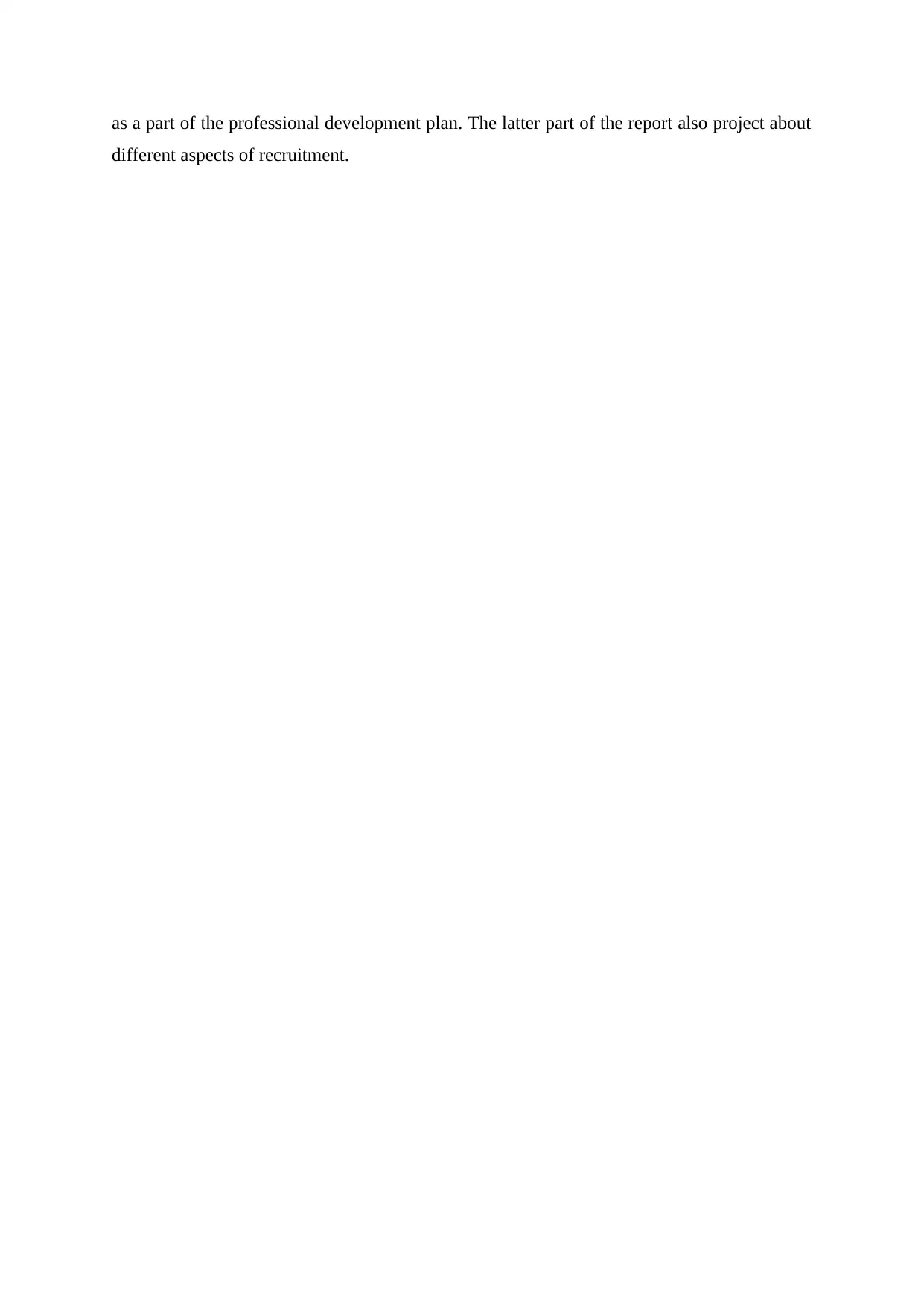
as a part of the professional development plan. The latter part of the report also project about
different aspects of recruitment.
different aspects of recruitment.
Paraphrase This Document
Need a fresh take? Get an instant paraphrase of this document with our AI Paraphraser
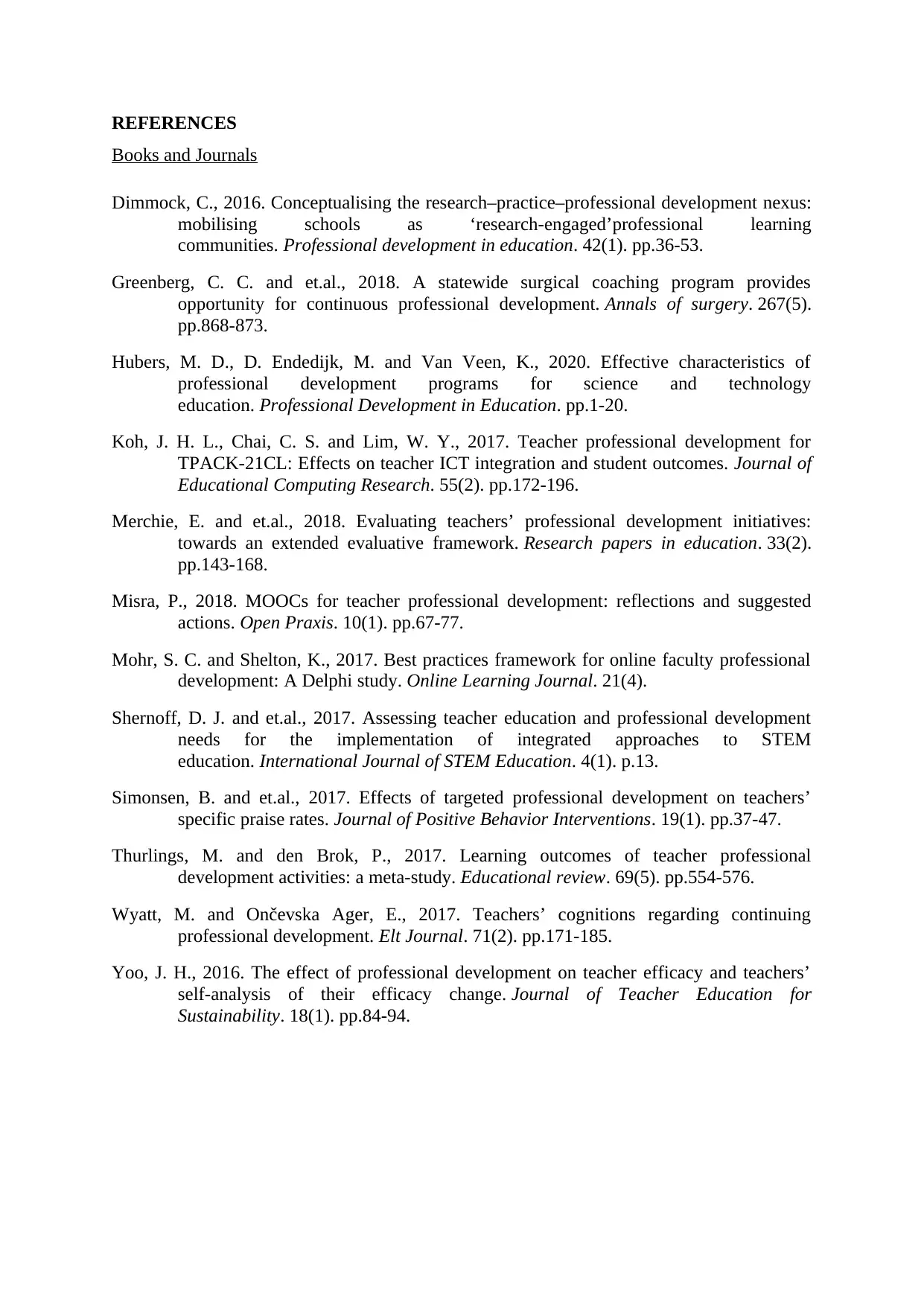
REFERENCES
Books and Journals
Dimmock, C., 2016. Conceptualising the research–practice–professional development nexus:
mobilising schools as ‘research-engaged’professional learning
communities. Professional development in education. 42(1). pp.36-53.
Greenberg, C. C. and et.al., 2018. A statewide surgical coaching program provides
opportunity for continuous professional development. Annals of surgery. 267(5).
pp.868-873.
Hubers, M. D., D. Endedijk, M. and Van Veen, K., 2020. Effective characteristics of
professional development programs for science and technology
education. Professional Development in Education. pp.1-20.
Koh, J. H. L., Chai, C. S. and Lim, W. Y., 2017. Teacher professional development for
TPACK-21CL: Effects on teacher ICT integration and student outcomes. Journal of
Educational Computing Research. 55(2). pp.172-196.
Merchie, E. and et.al., 2018. Evaluating teachers’ professional development initiatives:
towards an extended evaluative framework. Research papers in education. 33(2).
pp.143-168.
Misra, P., 2018. MOOCs for teacher professional development: reflections and suggested
actions. Open Praxis. 10(1). pp.67-77.
Mohr, S. C. and Shelton, K., 2017. Best practices framework for online faculty professional
development: A Delphi study. Online Learning Journal. 21(4).
Shernoff, D. J. and et.al., 2017. Assessing teacher education and professional development
needs for the implementation of integrated approaches to STEM
education. International Journal of STEM Education. 4(1). p.13.
Simonsen, B. and et.al., 2017. Effects of targeted professional development on teachers’
specific praise rates. Journal of Positive Behavior Interventions. 19(1). pp.37-47.
Thurlings, M. and den Brok, P., 2017. Learning outcomes of teacher professional
development activities: a meta-study. Educational review. 69(5). pp.554-576.
Wyatt, M. and Ončevska Ager, E., 2017. Teachers’ cognitions regarding continuing
professional development. Elt Journal. 71(2). pp.171-185.
Yoo, J. H., 2016. The effect of professional development on teacher efficacy and teachers’
self-analysis of their efficacy change. Journal of Teacher Education for
Sustainability. 18(1). pp.84-94.
Books and Journals
Dimmock, C., 2016. Conceptualising the research–practice–professional development nexus:
mobilising schools as ‘research-engaged’professional learning
communities. Professional development in education. 42(1). pp.36-53.
Greenberg, C. C. and et.al., 2018. A statewide surgical coaching program provides
opportunity for continuous professional development. Annals of surgery. 267(5).
pp.868-873.
Hubers, M. D., D. Endedijk, M. and Van Veen, K., 2020. Effective characteristics of
professional development programs for science and technology
education. Professional Development in Education. pp.1-20.
Koh, J. H. L., Chai, C. S. and Lim, W. Y., 2017. Teacher professional development for
TPACK-21CL: Effects on teacher ICT integration and student outcomes. Journal of
Educational Computing Research. 55(2). pp.172-196.
Merchie, E. and et.al., 2018. Evaluating teachers’ professional development initiatives:
towards an extended evaluative framework. Research papers in education. 33(2).
pp.143-168.
Misra, P., 2018. MOOCs for teacher professional development: reflections and suggested
actions. Open Praxis. 10(1). pp.67-77.
Mohr, S. C. and Shelton, K., 2017. Best practices framework for online faculty professional
development: A Delphi study. Online Learning Journal. 21(4).
Shernoff, D. J. and et.al., 2017. Assessing teacher education and professional development
needs for the implementation of integrated approaches to STEM
education. International Journal of STEM Education. 4(1). p.13.
Simonsen, B. and et.al., 2017. Effects of targeted professional development on teachers’
specific praise rates. Journal of Positive Behavior Interventions. 19(1). pp.37-47.
Thurlings, M. and den Brok, P., 2017. Learning outcomes of teacher professional
development activities: a meta-study. Educational review. 69(5). pp.554-576.
Wyatt, M. and Ončevska Ager, E., 2017. Teachers’ cognitions regarding continuing
professional development. Elt Journal. 71(2). pp.171-185.
Yoo, J. H., 2016. The effect of professional development on teacher efficacy and teachers’
self-analysis of their efficacy change. Journal of Teacher Education for
Sustainability. 18(1). pp.84-94.
1 out of 11
Related Documents
Your All-in-One AI-Powered Toolkit for Academic Success.
+13062052269
info@desklib.com
Available 24*7 on WhatsApp / Email
![[object Object]](/_next/static/media/star-bottom.7253800d.svg)
Unlock your academic potential
Copyright © 2020–2026 A2Z Services. All Rights Reserved. Developed and managed by ZUCOL.




